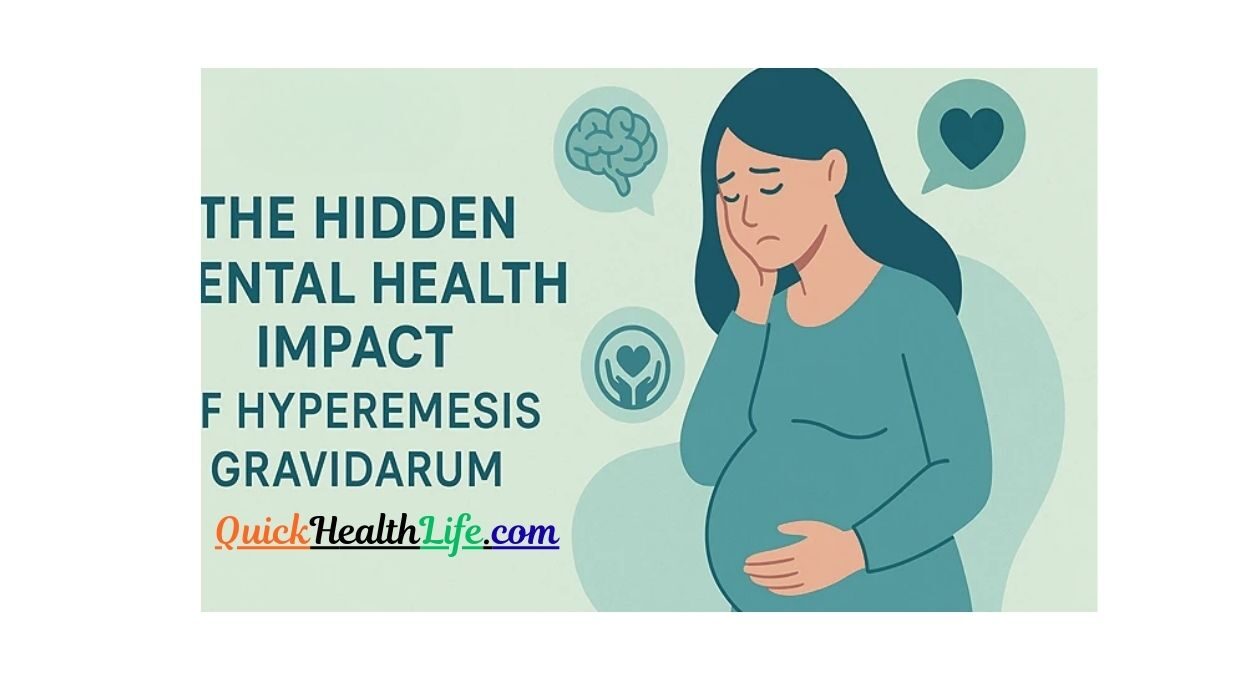Hyperemesis Gravidarum (HG). It is a severe form of morning sickness that affects many women during pregnancy. While most people think it is just about nausea and vomiting, the truth is that Hyperemesis Gravidarum can have a hidden and serious impact on mental health.
Many women with HG face depression, anxiety, stress, and even PTSD during and after pregnancy. In this article, we will explore the mental health impact of HG, the latest research in 2025, and how women can find support and treatment.
Table of Contents
What is Hyperemesis Gravidarum?
Hyperemesis Gravidarum is a pregnancy complication characterized by:
- Severe nausea
- Persistent vomiting
- Dehydration
- Weight loss
- Nutritional deficiencies
Unlike normal morning sickness, HG is extreme and long-lasting. It often requires medical care, hospitalization, and IV fluids.
But the problem is not just physical — HG deeply affects a woman’s mental health and emotional well-being.
Hyperemesis Gravidarum and Mental Health
Studies show a strong link between hyperemesis gravidarum and poor mental health outcomes. Women suffering from HG are more likely to experience:
- Depression
- Anxiety
- Stress
- PTSD (post-traumatic stress disorder)
- Postpartum depression
Does Hyperemesis Gravidarum Cause Depression?
Yes, many women with HG report symptoms of depression.
- Continuous vomiting and weakness make daily life difficult.
- Isolation and lack of understanding from family or society worsen the problem.
- Some women feel guilty for not enjoying pregnancy.
Research confirms that HG increases the risk of antenatal and postpartum depression compared to normal pregnancies.
Hyperemesis Gravidarum and Anxiety
Anxiety is another common mental health outcome of HG.
- Women fear constant nausea and vomiting.
- Many worry about their baby’s safety.
- Hospital visits and medical interventions add to the stress.
some cases, this anxiety continues even after pregnancy.
Severe Morning Sickness and Depression
Severe morning sickness like HG can:
- Limit a woman’s ability to work
- Affect relationships
- Cause feelings of hopelessness
Many women describe HG as “the darkest time” of their lives because of the emotional and mental strain.
Hyperemesis Gravidarum PTSD
Some women develop post-traumatic stress disorder (PTSD) after experiencing HG.
- Memories of extreme nausea and hospitalization remain painful.
- They may fear future pregnancies.
- Even after delivery, flashbacks and nightmares are possible.
Hyperemesis Gravidarum Postpartum Depression
The risk of postpartum depression is higher in women who experienced HG.
- Ongoing stress during pregnancy weakens mental health.
- Physical exhaustion and emotional trauma carry over into motherhood.
Psychological Impact of Hyperemesis Gravidarum
| Mental Health Outcome | Description |
|---|---|
| Depression | Sadness, hopelessness, loss of interest |
| Anxiety | Fear, constant worry, restlessness |
| Stress | Emotional burnout from physical illness |
| PTSD | Flashbacks and trauma from HG experience |
| Postpartum Depression | Depression after childbirth linked to HG |
Emotional Impact of Hyperemesis Gravidarum
The emotional toll of HG is heavy:
- Feeling of being trapped in illness
- Guilt for not being able to enjoy pregnancy
- Frustration with repeated medical treatments
- Loneliness due to lack of awareness in society
Long-Term Effects of Hyperemesis Gravidarum on Mental Health
Even after pregnancy, HG can leave long-term scars on mental health:
- Ongoing anxiety and fear of pregnancy
- Relationship strain
- Lower self-esteem
- Reduced quality of life
Hyperemesis Gravidarum Research 2025
Latest studies in 2025 confirm:
- Women with HG are at double the risk of depression during pregnancy.
- 1 in 4 women with HG may develop PTSD after childbirth.
- Early mental health support reduces the risk of long-term problems.
This research highlights the need for psychological care along with medical treatment for HG.
Hyperemesis Gravidarum and Maternal Mental Health
HG doesn’t just affect the mother’s body — it affects her entire maternal experience. Poor mental health outcomes impact:
- Bonding with the baby
- Family relationships
- Recovery after delivery
Hyperemesis Gravidarum and Mood Disorders
Mood disorders like bipolar disorder and severe depression may worsen with HG. Doctors suggest regular mental health screening for pregnant women with HG.
Hyperemesis Gravidarum Therapy and Support
The good news is that support and therapy can help.
Treatment and Support Options:
- Counseling & Therapy – Talking to a psychologist reduces stress.
- Support Groups – Sharing experiences with other HG mothers helps emotional healing.
- Medication – In some cases, safe antidepressants or anti-anxiety medicines may be prescribed.
- Family Support – Understanding and emotional care from family is vital.
Hyperemesis Gravidarum Psychological Care
Doctors now recommend psychological care as part of HG treatment. This includes:
- Screening for depression and anxiety
- Providing therapy during pregnancy
- Postpartum follow-up for mental health
FAQs
Q1. Does hyperemesis gravidarum cause depression?
Yes, many women with HG experience antenatal and postpartum depression.
Q2. What is the psychological impact of hyperemesis gravidarum?
It can lead to depression, anxiety, stress, PTSD, and emotional trauma.
Q3. Can hyperemesis gravidarum cause PTSD?
Yes, research shows up to 25% of women with HG develop PTSD.
Q4 How can women with HG protect their mental health?
Through counseling, therapy, support groups, and family care.
Q5. What is the long-term effect of hyperemesis gravidarum?
Fear of future pregnancies, ongoing anxiety, and risk of depression.



